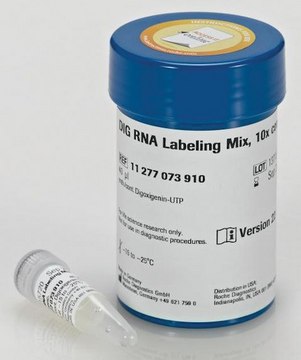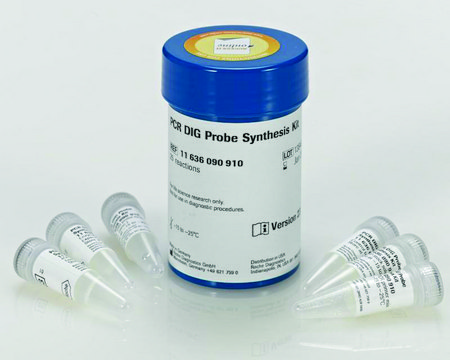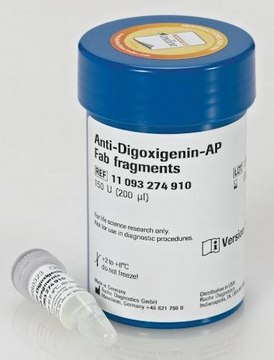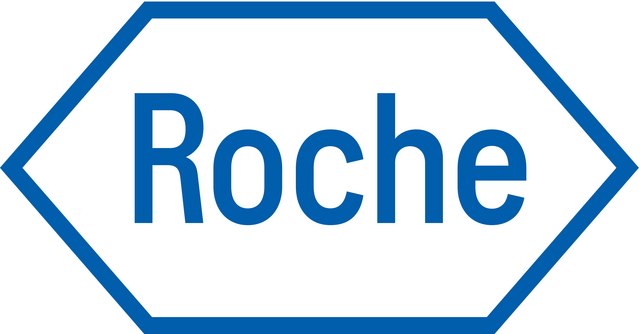11175033910
Roche
DIG DNA Labeling Kit
sufficient for 40 labeling reactions, kit of 1 (7 components), suitable for hybridization
Synonym(s):
dig, dna labeling kit, dig
Sign Into View Organizational & Contract Pricing
All Photos(1)
About This Item
UNSPSC Code:
41105500
Recommended Products
usage
sufficient for 40 labeling reactions
Quality Level
packaging
kit of 1 (7 components)
manufacturer/tradename
Roche
greener alternative product characteristics
Designing Safer Chemicals
Learn more about the Principles of Green Chemistry.
sustainability
Greener Alternative Product
technique(s)
hybridization: suitable
greener alternative category
, Aligned
storage temp.
−20°C
General description
DIG DNA Labeling Kit is a convenient kit for the labeling of DNA with Digoxigenin-deoxyuridine triphosphate (dUTP) using random oligonucleotides as primers. In this method, the complementary DNA strand of denatured DNA is synthesized by Klenow polymerase using the 3′-OH termini of the random oligonucleotides as primers.
We are committed to bringing you Greener Alternative Products, which adhere to one or more of The 12 Principles of Greener Chemistry. This product is designed as a safer chemical. The DIG System was established as a sensitive and cost-effective alternative to radioactivity for the labeling and detection of nucleic acids. There are many available publications that prove the versatility of the DIG System, so use of radio-labeling is no longer the only option for labeling of DNA for hybridization.
Specificity
Heat inactivation: Stop the reaction by adding 2 μl 0.2 M EDTA (pH 8.0) and/or by heating to 65 °C for 10 minutes.
Application
For Random-primed labeling of DNA probes with DIG-11-dUTP, alkali-labile. DIG-labeled DNA probes can be used for:
- All types of filter hybridization according to our standard protocol given in the pack insert of the special hybridization solution DIG Easy Hyb.
- Single-copy gene detection in total genomic DNA, even from organisms with high complexity, for example, human, barley, and wheat.
- In situ hybridizations
Packaging
1 kit containing 7 components.
Quality
Function tested in a Southern blot.
Specifications
Assay Time: Labeling: 1hour to O/N
Sensitivity and specificity: A single-copy human gene (tPA gene) is detected with a DIG-labeled probe in a Southern blot of 1μg digested human placenta DNA.
Sensitivity and specificity: A single-copy human gene (tPA gene) is detected with a DIG-labeled probe in a Southern blot of 1μg digested human placenta DNA.
Principle
DIG-labeled DNA probes are generated according to the random-primed DNA labeling method which is based on the hybridization of random oligonucleotides to the denatured DNA template. The complementary DNA strand is synthesized by Klenow enzyme which uses the 3′-OH termini of the random oligonucleotides as primers and a mixture of deoxyribonucleotides containing DIG-11-dUTP, alkali-labile for elongation. This results in incorporation of digoxigenin into the newly synthesized DNA.
Note:
Note:
- The use of the alkali-labile form of DIG-11-dUTP enables easier and more efficient stripping of blots for rehybridization experiments with a second DIG-labeled probe.
- DNA probe, labeled with DIG-11-dUTP, alkali-labile must not be denatured using NaOH, but can be denatured by boiling in a waterbath.
Other Notes
For life science research only. Not for use in diagnostic procedures.
Kit Components Only
Product No.
Description
- Unlabeled Control DNA 1 100 µg/ml
- Unlabeled Control DNA 2 100 µg/ml
- DNA Dilution Buffer
- DIG-labeled Control DNA 5.2 µg/ml
- Hexanucleotide Mix 10x concentrated
- dNTP Labeling Mixture 10x concentrated
- Klenow Enzyme, Labeling grade 2 U/µl
Storage Class
12 - Non Combustible Liquids
wgk_germany
WGK 1
flash_point_f
does not flash
flash_point_c
does not flash
Choose from one of the most recent versions:
Already Own This Product?
Find documentation for the products that you have recently purchased in the Document Library.
Customers Also Viewed
Our team of scientists has experience in all areas of research including Life Science, Material Science, Chemical Synthesis, Chromatography, Analytical and many others.
Contact Technical Service







